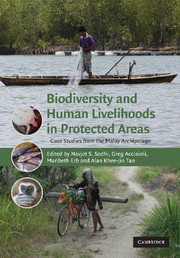Book contents
- Frontmatter
- Contents
- List of contributors
- Acknowledgements
- 1 General introduction
- Part I Conservation needs and priorities
- Part II Conservation with and against people(s)
- Part III Legal and governance frameworks for conservation
- 23 Introduction to Part III
- 24 Protected-area management in Indonesia and Malaysia: the challenge of divided competences between centre and periphery
- 25 Protecting sovereignty versus protecting parks: Malaysia's federal system and incentives against the creation of a truly national park system
- 26 What protects the protected areas? Decentralization in Indonesia, the challenges facing its terrestrial and marine national parks and the rise of regional protected areas
- 27 Learning from King Canute: policy approaches to biodiversity conservation, lessons from the Leuser Ecosystem
- 28 Conclusion to Part III
- 29 General conclusion
- Index
28 - Conclusion to Part III
from Part III - Legal and governance frameworks for conservation
Published online by Cambridge University Press: 12 November 2009
- Frontmatter
- Contents
- List of contributors
- Acknowledgements
- 1 General introduction
- Part I Conservation needs and priorities
- Part II Conservation with and against people(s)
- Part III Legal and governance frameworks for conservation
- 23 Introduction to Part III
- 24 Protected-area management in Indonesia and Malaysia: the challenge of divided competences between centre and periphery
- 25 Protecting sovereignty versus protecting parks: Malaysia's federal system and incentives against the creation of a truly national park system
- 26 What protects the protected areas? Decentralization in Indonesia, the challenges facing its terrestrial and marine national parks and the rise of regional protected areas
- 27 Learning from King Canute: policy approaches to biodiversity conservation, lessons from the Leuser Ecosystem
- 28 Conclusion to Part III
- 29 General conclusion
- Index
Summary
The chapters in this part provide a stark reminder that biological and sociological imperatives relating to protected areas often become imperilled by badly designed state laws and policies. This is particularly so when these are accompanied by weak enforcement, political jostling among multiple agencies and uncertain demarcations of competence between central and local authorities. All too alarmingly, it often appears that these systemic pathologies are deficient by design, rather than circumstance, such that they induce a culture that encourages the use of both legal and extra-legal means to compromise the ecological integrity of protected areas and the legitimate rights of communities that depend on them.
As identified by the various authors, incentives must be found for governments and local communities alike to recognize the benefits of protected areas. Experiments at co-management can be undertaken and fine tuned to reconcile the various competing demands on protected areas and their resources and to foster multistakeholder participation in the running of national parks and other protected areas. These strategies depend on the creation of incentives for stakeholders to participate in the protection of biodiversity, as opposed to a ‘fines and fences’ approach that attempts to cut off local communities' access to protected areas.
Looking ahead, it is clear that governance reform issues must continue to take centre stage for protected-area and natural-resource management efforts, both in Indonesia and Malaysia.
Information
- Type
- Chapter
- Information
- Biodiversity and Human Livelihoods in Protected AreasCase Studies from the Malay Archipelago, pp. 457 - 458Publisher: Cambridge University PressPrint publication year: 2007
